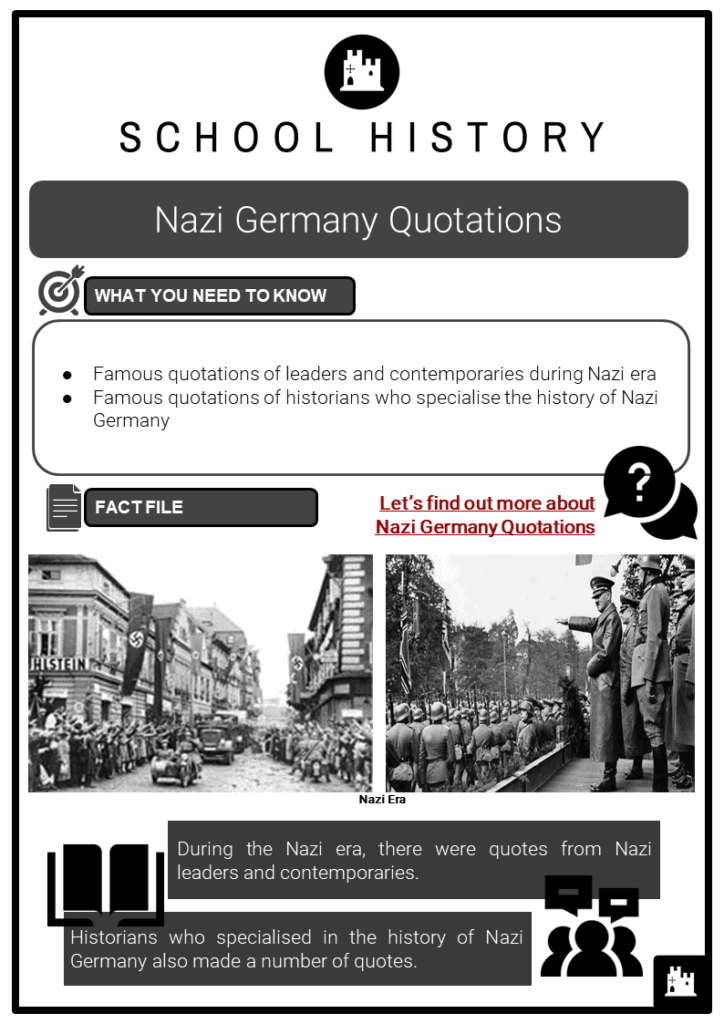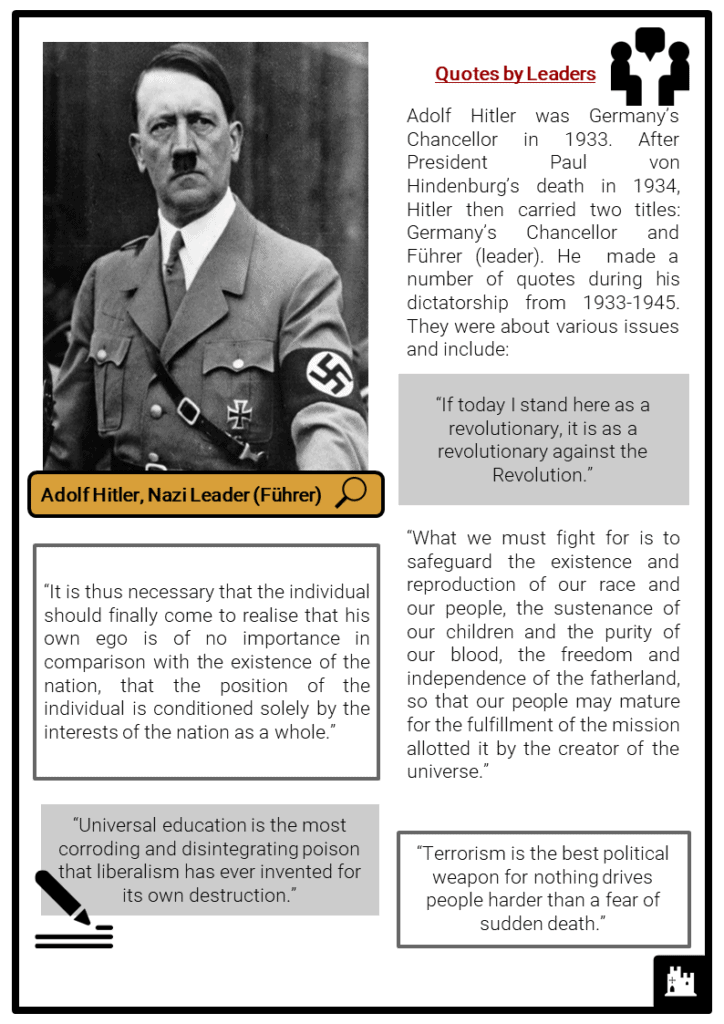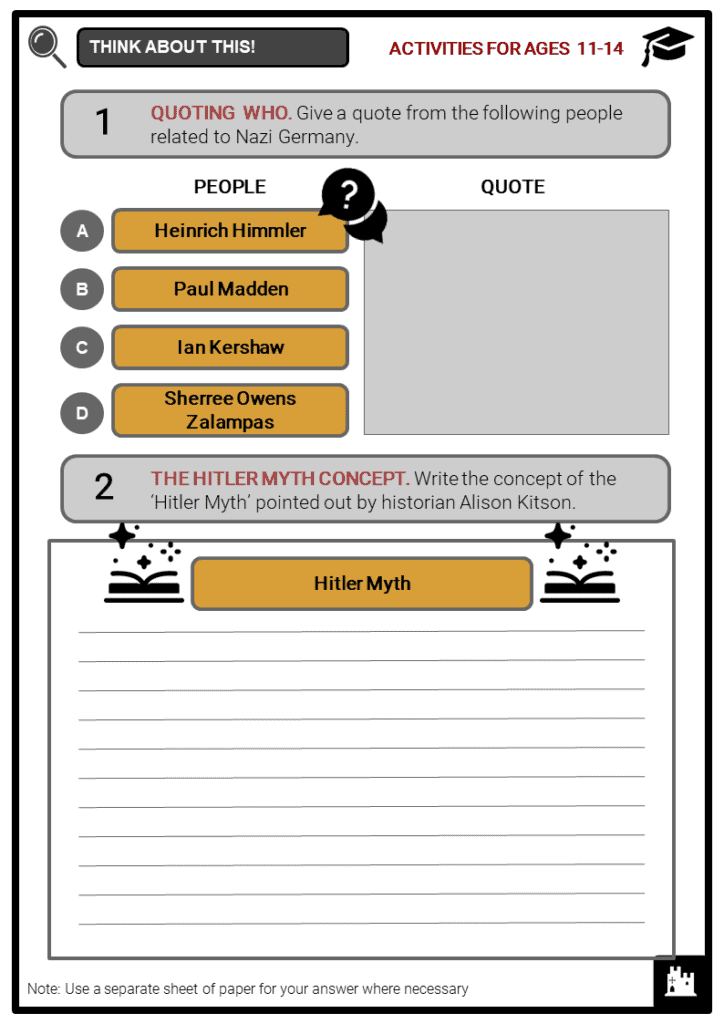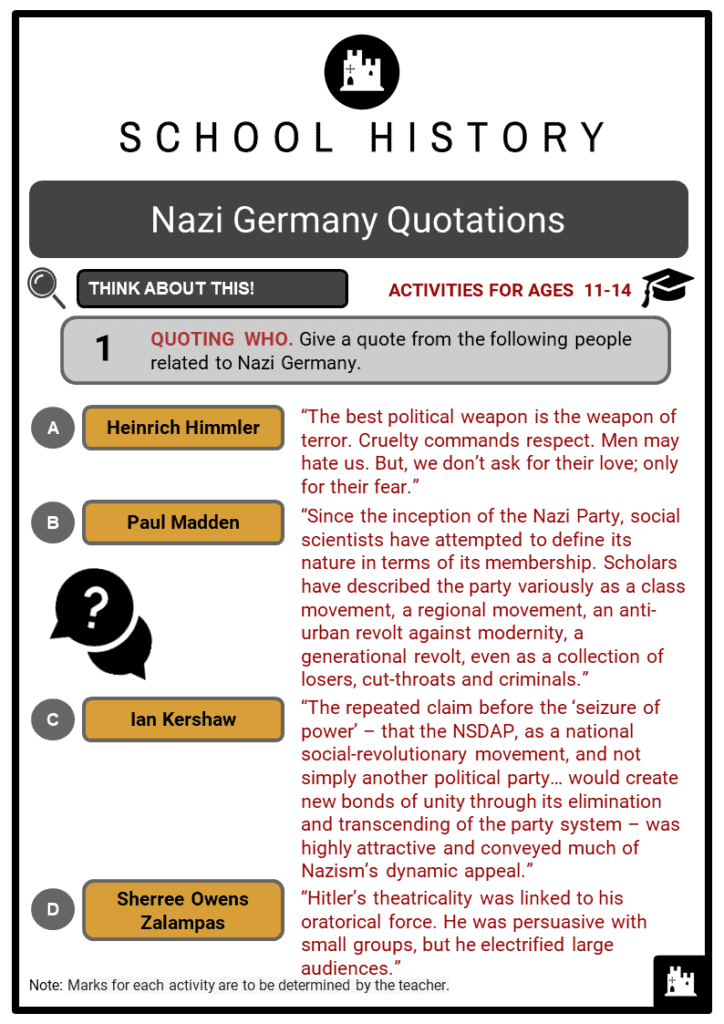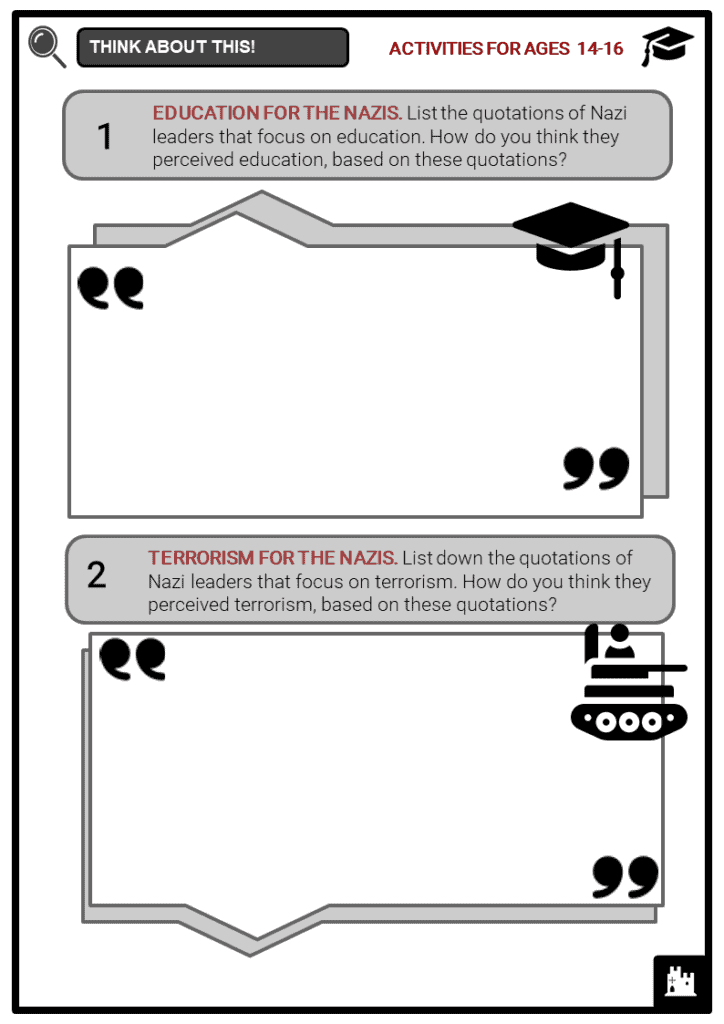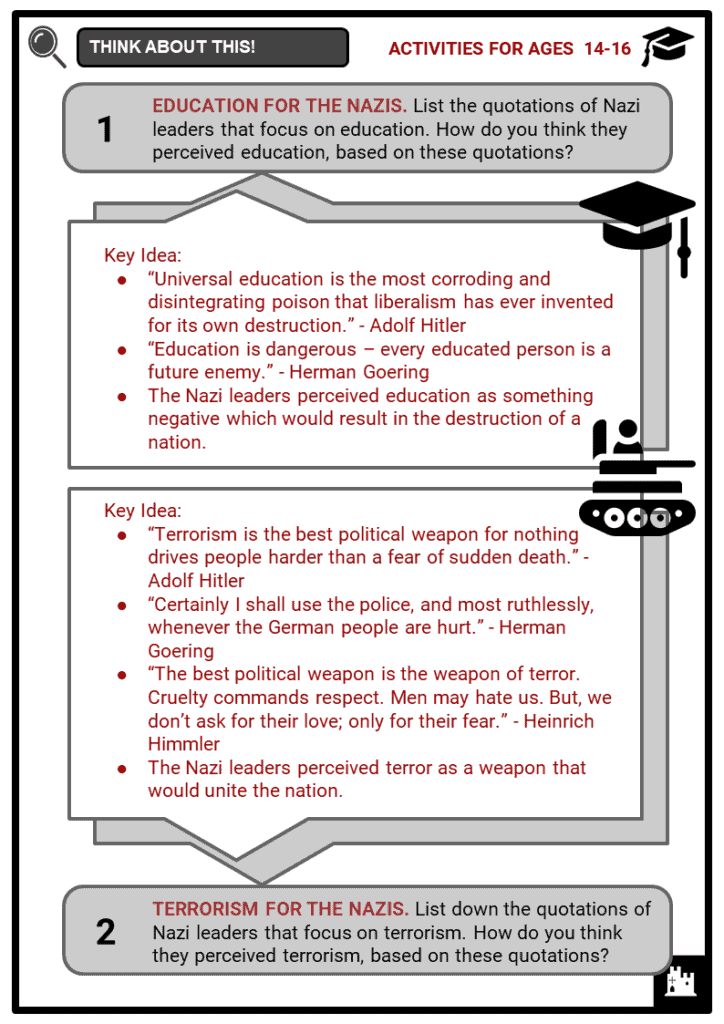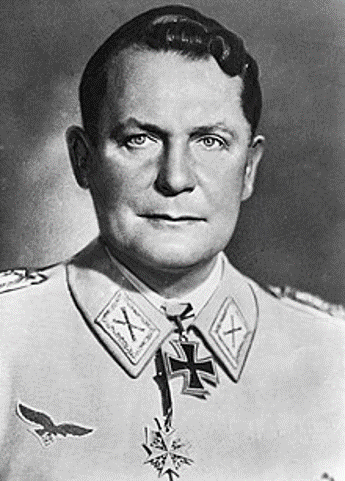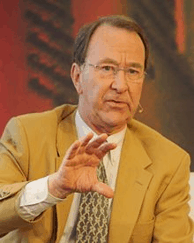Download Nazi Germany Quotations Worksheets
Do you want to save dozens of hours in time? Get your evenings and weekends back? Be able to teach Nazi Germany Quotations to your students?
Our worksheet bundle includes a fact file and printable worksheets and student activities. Perfect for both the classroom and homeschooling!
Table of Contents
Add a header to begin generating the table of contents
Summary
- Famous quotations of leaders and contemporaries during Nazi era
- Famous quotations of historians who specialise the history of Nazi Germany
Key Facts And Information
Let’s find out more about Nazi Germany Quotations
- During the Nazi era, there were quotes from Nazi leaders and contemporaries.
- Historians who specialised in the history of Nazi Germany also made a number of quotes.
Quotes by Leaders
Adolf Hitler, Nazi Leader (Führer)
- Adolf Hitler was Germany’s Chancellor in 1933. After President Paul von Hindenburg’s death in 1934, Hitler then carried two titles: Germany’s Chancellor and Führer (leader). He made a number of quotes during his dictatorship from 1933-1945. They were about various issues and include:
- “If today I stand here as a revolutionary, it is as a revolutionary against the Revolution.”
- “What we must fight for is to safeguard the existence and reproduction of our race and our people, the sustenance of our children and the purity of our blood, the freedom and independence of the fatherland, so that our people may mature for the fulfillment of the mission allotted it by the creator of the universe.”
- “It is thus necessary that the individual should finally come to realise that his own ego is of no importance in comparison with the existence of the nation, that the position of the individual is conditioned solely by the interests of the nation as a whole.”
- “Universal education is the most corroding and disintegrating poison that liberalism has ever invented for its own destruction.”
- “Terrorism is the best political weapon for nothing drives people harder than a fear of sudden death.”
- “The goal of female education must invariably be the future mother.”
- “The National Socialist Party will prevent in the future, by force if necessary, all meetings and lectures which are likely to exercise a depressing influence on the German state.”
- “All propaganda has to be popular and has to accommodate itself to the comprehension of the least intelligent of those whom it seeks to reach.”
- “The National Government will regard it as its first and foremost duty to revive in the nation the spirit of unity and cooperation. It will preserve and defend those basic principles on which our nation has been built. It regards Christianity as the foundation of our national morality, and the family as the basis of national life.”
- “Through clever and constant application of propaganda, people can be made to see paradise as hell, and also the other way round, to consider the most wretched sort of life as paradise.”
- “Any alliance whose purpose is not the intention to wage war is senseless and useless.”
Hermann Goering, NSDAP Leader
- The NSDAP stood for National Socialist German Workers’ Party and Hermann Goering was its leader.
- “I joined the party because I was a revolutionary, not because of any ideological nonsense.”
- “The people can always be brought to the bidding of their leaders. All you have to do is tell them that they are in danger of being attacked and denounce the pacifists for lack of patriotism and exposing the country to danger.”
- “Certainly I shall use the police, and most ruthlessly, whenever the German people are hurt. But I refuse the notion that the police are protective troops for Jewish stores. No, the police protect whoever comes into Germany legitimately, but it does not exist for the purpose of protecting Jewish money-lenders.”
- “Education is dangerous – every educated person is a future enemy.”
- “When I hear anyone talk of culture, I reach for my revolver.”
Heinrich Himmler
- Himmler was the leader of the Schutzstaffel or SS (German for “protective echelon”). He was also the main architect of the Holocaust.
- “The best political weapon is the weapon of terror. Cruelty commands respect. Men may hate us. But, we don’t ask for their love; only for their fear.”
- “All of us, who are members of the Germanic peoples, can be happy and thankful that once in thousands of years fate has given us, from among the Germanic peoples, such a genius, a leader, our Führer Adolf Hitler, and you should be happy to be allowed to work with us.”
Quotes by Historians
Eugene Davidson
- “In many ways, Nazism was antithetical to what the great mass of Germans said they admired – and certainly to what they paid homage. It was noisy, undisciplined, vainglorious; its leader was a half-educated posturing foreigner. National Socialists were regarded as hoodlums, as part of the breakdown of what had been, if anything, an excessively ordered society before.”
Mary Fulbrook
- “The Nazi Party was, in the early 1920s, but one among many nationalist and volkisch radical political groups. It was catapulted to prominence with the onset of economic recession in the late 1920s … The Nazis owed their spectacular rise to a combination of two discrete sets of factors: first, their distinctive organisation and strategy; and secondly, the wider socio-economic conditions which created climates of opinion and sets of grievances on which the Nazis could prey.”
Enzo Collotti and Valerio Lintner
- “The NSDAP, as it was renamed on February 24th, 1920, at first represented a modest nucleus of war veterans, the unemployed and the lower working classes … the party built its political fortune to the point of attracting wide-ranging support and taking power on the basis of this popular support.”
Paul Madden
- “Since the inception of the Nazi Party, social scientists have attempted to define its nature in terms of its membership. Scholars have described the party variously as a class movement, a regional movement, an anti-urban revolt against modernity, a generational revolt, even as a collection of losers, cut-throats and criminals.”
Ian Kershaw
- “The repeated claim before the ‘seizure of power’ – that the NSDAP, as a national social-revolutionary movement, and not simply another political party… would create new bonds of unity through its elimination and transcending of the party system – was highly attractive and conveyed much of Nazism’s dynamic appeal.”
Theodore Abel
- “Support for the NSDAP extended far beyond the lower middle class to elements of the socially established Grossburgertum (upper middle class) as well as to sizeable segments of the blue-collar working class. At the height of its electoral popularity in 1932, the NSDAP had managed to transcend the basic cleavages of German political culture, mobilising a mass following that was without precedent in its extraordinary social diversity.”
Bernard Norling and Walter Rinderle
- “Nazism seemed to many just an extreme version of what [most Germans] had always believed in or taken for granted. It was nationalistic, respectful of the armed forces, socially conservative, disdainful of laziness, hostile to eccentric or incomprehensive ideas that came from cities, disapproving of homosexuals and other unconventional human types, and avid to achieve ‘greatness’ for Germany. They welcomed parts of the Nazi political and social smorgasbord and told themselves that the rest was less important or was not meant seriously.”
Walter A. P. Phillips
- “Before total war, Nazism was a potpourri. Racialism … and nationalism … jostled shoulders with the socialistic revolutionary conservatism of many members of the Mittelstand (middle class). Romantic ideas came from right-wing youth groups. Hitler could utter the gospel of anti-capitalism to workers and the gospel of profits to businessmen. [It was] a rag-bag of inconsistent and incoherent ideas.”
Alison Kitson
- “A ‘Hitler myth’ was cultivated which built on people’s desire for strong leadership, and presented Hitler as an almost God-like figure. Hitler’s image was laboured over in a manner not dissimilar to that of pop stars today. What he wore, what he said, what postures he adopted during speeches were all worked out carefully … Many people began to separate Hitler from the Nazi Party, enabling Hitler’s popularity to remain high whilst the popularity of the Nazi Party fell.”
Sherree Owens Zalampas
- “Hitler’s theatricality was linked to his oratorical force. He was persuasive with small groups, but he electrified large audiences.”
- “Without the changed conditions, the product of a lost war, a revolution and a pervasive sense of national humiliation, Hitler would have remained a nobody. His main ability by far, as he came to realise during the course of 1919, was that in the prevailing circumstances he could inspire an audience which shared his basic political feelings by the way he spoke, by the force of his rhetoric, by the very power of his prejudice, by the conviction he conveyed that there was a way out of Germany’s plight.”
Sebastian Haffner
- “A state does not simply fall apart as a result of depression … [Weimar Germany] was not destroyed by economic depression or widespread unemployment, though these naturally contributed to the atmosphere of doom, but because the Weimar Right was resolved to abolish the parliamentary state in favour of a vaguely conceived authoritarian state.”
Joseph Goebbels
- “If you tell a lie big enough and keep repeating it, people will eventually come to believe it. The lie can be maintained only for such time as the State can shield the people from the political, economic and/or military consequences of the lie. It thus becomes vitally important for the State to use all of its powers to repress dissent, for the truth is the mortal enemy of the lie, and thus by extension, the truth is the greatest enemy of the State.”
Eric Hoffer
- “Unless a man has talents to make something of himself, freedom is an irksome burden. Of what avail is freedom to choose if the self be ineffectual? We join a mass movement to escape individual responsibility, or, in the words of the ardent young Nazi, ‘to be free from freedom.’”
William Shirer
- “Chamberlain’s stubborn, fanatical insistence on giving Hitler what he wanted, his trips to Berchtesgaden and Godesberg and finally the fateful journey to Munich rescued Hitler from his limb and strengthened his position in Europe, in Germany, in the Army, beyond anything that could have been imagined a few weeks before. It also added immeasurably to the power of the Third Reich.”
Image sources:

